Why do babies hit themselves? While it looks odd, there are some common, normal reasons for this behavior. However, some reasons should warrant your attention.
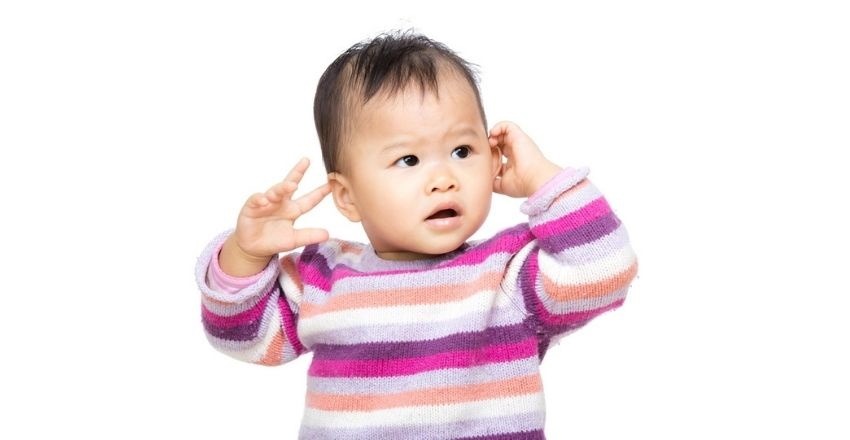
Mom’s Question:
Why do babies hit themselves? My 6-month-old baby girl hits herself… She started hitting her chest, and now she hits her mouth and head. I need to know why they do this. Should I worry that something is wrong?
Thanks,
Tina (KY.)
In this article…
Babies That Hit Themselves: Occurrence and Age Groups
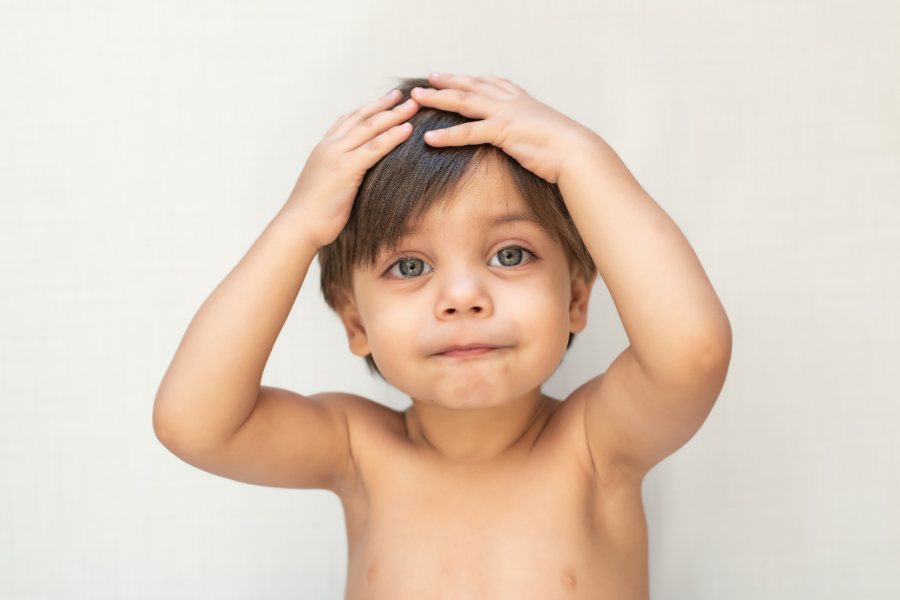
It does look pretty strange and sometimes even scary when babies start hitting themselves. But this behavior is very common, just like biting or banging their heads against the floor. These are called stereotypic movements or stereotypes. Some studies indicate that at least 20-25% of all babies and toddlers do this for some periods of time.
Headbanging is more common in males.
Around the age of 6 months is also mentioned as a common starting point in particular for this behavior, according to Kiran Pure, a child psychologist interviewed in Today’s Parent here. (Opens in new window)
Reasons Why Babies Hit Themselves
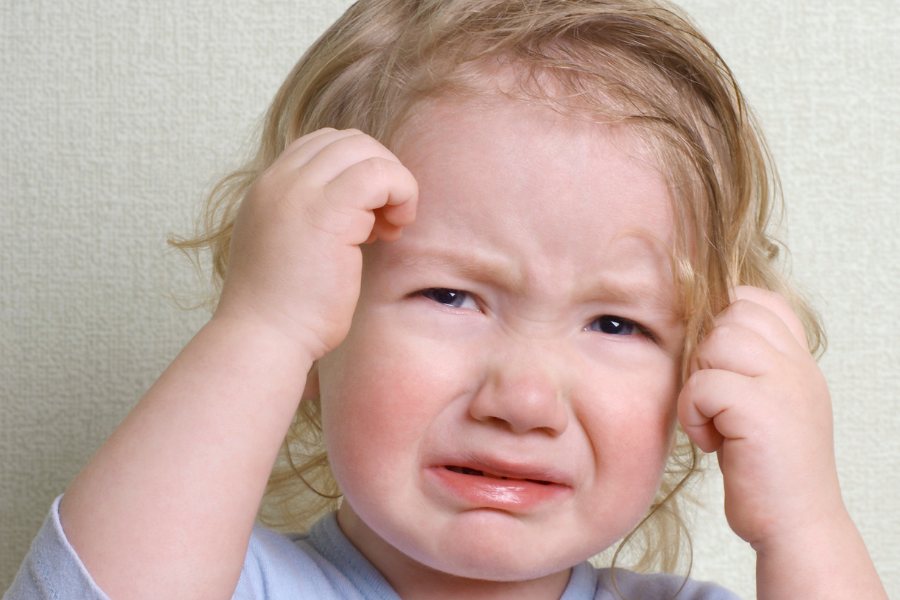
There are several different reasons why babies develop this behavior.
1. A way to calm oneself down
Older babies and toddlers sometimes hit themselves when they experience strong feelings of frustration, anger, or anxiety, for example, in temper tantrums. These babies are simply trying to find ways to cope with how they are feeling at the moment.
At this age, they can’t really express their feelings verbally, either, which makes the situation even more difficult for them.
When this happens, it is a good idea as a parent to stay calm and avoid losing our own temper. Our job is to help the child calm down, not start throwing our own tantrums! This can be easier said than done, but reminding ourselves that our kids will do what we do can help us stay calm and deal with a tantrum in a calm and loving way.
2. A Reaction to Pain
Sometimes, infants consistently hit one side of the head in a reaction to physical pain. This may be due to an ear infection or discomfort while teething.
In this case, hitting may be a way to achieve distraction and mitigate the pain. If you suspect pain to be the cause and it is not due to teething, it may be a good idea to contact your child’s pediatrician.
3. A way to stimulate oneself
Sometimes, babies and toddlers are either tired, lonely, or under-stimulated, causing them to hit themselves as a sensory input to stimulate their bodies and increase their activity.
This is common behavior, especially if your child is alone and unengaged. If you suspect under-stimulation as a reason for your baby hitting themselves, try engaging in more activities with them and see where it goes!
You’ll find some suggested games to play with 6-month-old babies here.
4. Control and curiosity
Young babies can hit themselves simply because they are gaining control of their bodies and might find it interesting or entertaining to explore what they can do with their bodies, such as slapping their tummy. For example, many moms report that their babies hit themselves in their heads lightly while nursing.
5. Self-Comfort and Sleep
Sometimes, these young children may feel that head banging helps them recall the feeling of being rocked to sleep at night, which they derive pleasure from. Hitting themselves rhythmically is thought to be relaxing and self-soothing for them.
This is very common and considered normal unless the child hits themselves so hard that they get hurt or it affects the child’s sleep negatively. (See below about sleep disorders).
You can read here about a baby that hit her head when tired.
Another similar behavior is shaking their head while falling asleep.
While soft head-hitting and head-banging as part of falling asleep is not considered a self-harming behavior, you can still try to reduce the behavior by substituting if for some other soothing bedtime routine, such as a lullaby while hugging a lovey (stuffed animal).
6. Getting Attention
Babies may also hit themselves because we, as parents, reinforce the behavior!
For example, in some cases, they lack enough attention from their parents or caregivers and slowly realize that by head banging more often, they get the attention they want.
The solution, in this case, is not to make a big deal of the banging but rather use distraction and remember to give your child undivided attention and positive reinforcement when they show behaviors that you do want to reinforce.
7. Working out their imagination
Infants and young children may resort to hitting themselves as a substitute for certain activities they would like to do at the time. While their imagination is infinite, because of their limitations as kids, they are often limited by their surroundings and the oversight of their caretakers. In this case, the hitting is actually a part of your child’s free playing.
8. Disorders with sleep or development
Most of the time, children hitting themselves grow up with normal behavior. However, there is always a small chance that this is a sign of possible sleep or developmental disorders.
If your child always hits themselves just before falling asleep and there are no other unusual behaviors, it may be a way for them to lull themselves to sleep. This is normal, but if the hitting is violent and frequent enough to injure the child or disturb their sleep, the behavior might qualify for diagnosis as a sleep-related rhythmic movement disorder. A detailed overview of sleep-related rhythmic disorders can be found in this article at Sleepeducation.org.
In addition, some developmental conditions, such as autism spectrum disorder, can involve head slapping. If a child who hits themselves also has symptoms such as strong displays of emotion, other repetitive behaviors, or developmental delays, the child should be brought to a pediatrician for assessment.
When Does the Hitting Stop?
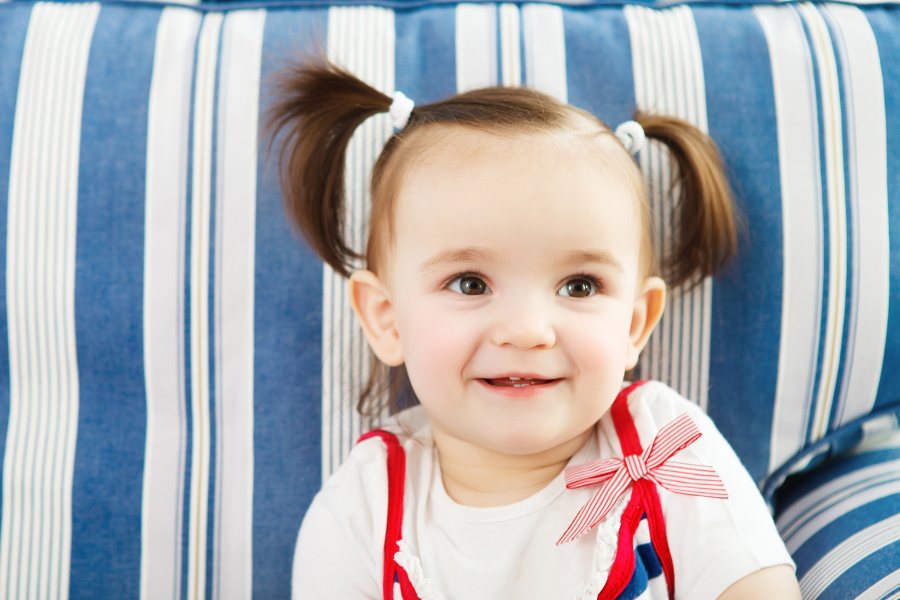
Self-stimulation behavior, such as hitting oneself, develops before the first year and may worsen until 2 years of age. Most of these stereotypes last until the preschool period.
If the behavior isn’t due to pain or a medical condition, it can last for some time. My youngest started hitting himself and biting his hand when angry at around eight months of age and continued until he was almost three years old.
He is a textbook example of normal babies hitting themselves – most babies start doing this at some point between 6 and 12 months old.
The behavior tends to peak at around 24-30 months when many babies are going through rapid mental development and have big problems dealing with their own frustrations. This is part of normal development during early childhood and is expected. (It isn’t called the “terrible twos” for nothing.)
While some babies may hit themselves for a couple of months only, others go on for years. Most babies grow out of it at around three years old, if not earlier.
What To Do When Babies Hit Themselves
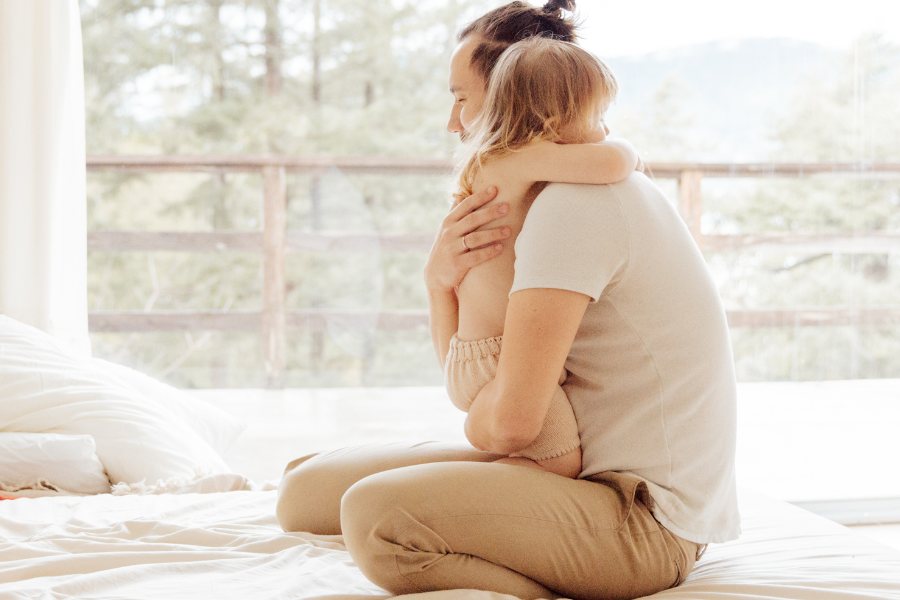
First of all, you need to track down why your baby is hitting herself. Make sure to rule out any illness, such as an ear infection, a sore throat, or teething. If it looks like your child has a medical condition, seek consultation with your baby’s healthcare provider.
If your child engages in various repetitive or rhythmic movements, including hitting, body-rocking, or similar behaviors without any identifiable trigger, you should contact your child’s doctor as soon as possible since such behavior can be a sign of a developmental problem.
If the hitting is not development or pain-related, see if you can find a pattern of when this is more likely to occur.
Does your baby tend to hit herself when she is tired, hungry, under-stimulated, or needs a cuddle or attention? If you can find a pattern, try to adjust the routines around that situation to reduce the risk of your baby becoming upset.
Just to reiterate, head banging is, more often than not, an expected part of a child’s development. Most babies who exhibit this behavior grow up as normal children.
Above all else, ensure your child is in a safe environment when they engage in head-banging behavior. If they still use the crib; clasps and rails should be secured properly. Avoid using crib bumpers, as these can lead to possible strangulation or suffocation. Make sure that your child can’t accidentally get injured on any sharp edges or hard surfaces.
Something to remember is not to reinforce the behavior.
During the day, distracting them by offering different forms of play is the best way to stop unwanted behavior until your baby is over 2 years old and has started to understand the spoken language well. Try to make her focus on something more enjoyable than hitting!
Something to remember is not to reinforce the behavior. For example, if the head banging happens at night, don’t check in on them every few minutes. If they do it during the day, don’t react too much or try to stop them. If you do react a lot, your baby may associate the banging with getting your attention (yay!), causing them to do it even more often. So don’t make a big deal about it. Just make sure your baby doesn’t hurt herself.
Keep your own emotions under control. If your child’s head-banging is connected to anger, it is easy to become angry as a parent, too. However, a big reaction from the adult will not improve the situation and will not help the child learn how to deal with anger in more appropriate ways. Remind yourself that your child is not “bad” or “spoilt”. They simply haven’t learned yet how to deal with strong emotions in more effective ways. The best thing you can do as a parent (as always) is to be a role model and stay calm. Find effective ways to deal with toddler tantrums here.
When to Worry

As already mentioned, headbanging and other ways of hitting themselves can, in rare cases, be a sign of a developmental issue. In these situations, there will be other signs as well, such as falling behind several other developmental milestones or losing certain abilities he used to have.
Extremely frequent head-banging, either throughout the whole day or continuously, even if it clearly hurts already, can also be a sign of concern. Some children will choose self-stimulatory behavior, such as head banging, over interacting with others.
If you notice any of these situations, having your child seen by a child psychiatrist or psychologist is best.
Watch this video for clear examples of autism-related behaviors, including headbanging.
You can read about the warning signs of autism here.
Conclusion
As you have seen, babies hit themselves for several reasons. The bottom line is that even if it looks odd and can be frustrating to deal with for parents, it is most often a common and normal behavior related to self-soothing, self-stimulation, or general development during the baby and toddler years.
If you suspect that the hitting is related to pain that requires medical attention or developmental issues, contact a doctor as soon as possible.
Early intervention is always the best!
Listen to this medical doctor for some more ideas on what to do about the head-banging and when to worry.
Read Next
- Babies Hitting Themselves Out Of Anger And Frustration
- Baby Hitting Head When Tired
- If Baby is Shaking Head Side to Side, Check These 4 Reasons
- Important Warning Signs of Autism in Babies and Toddlers
I hope this helps,
Paula
Who can relate? Add your comments below.
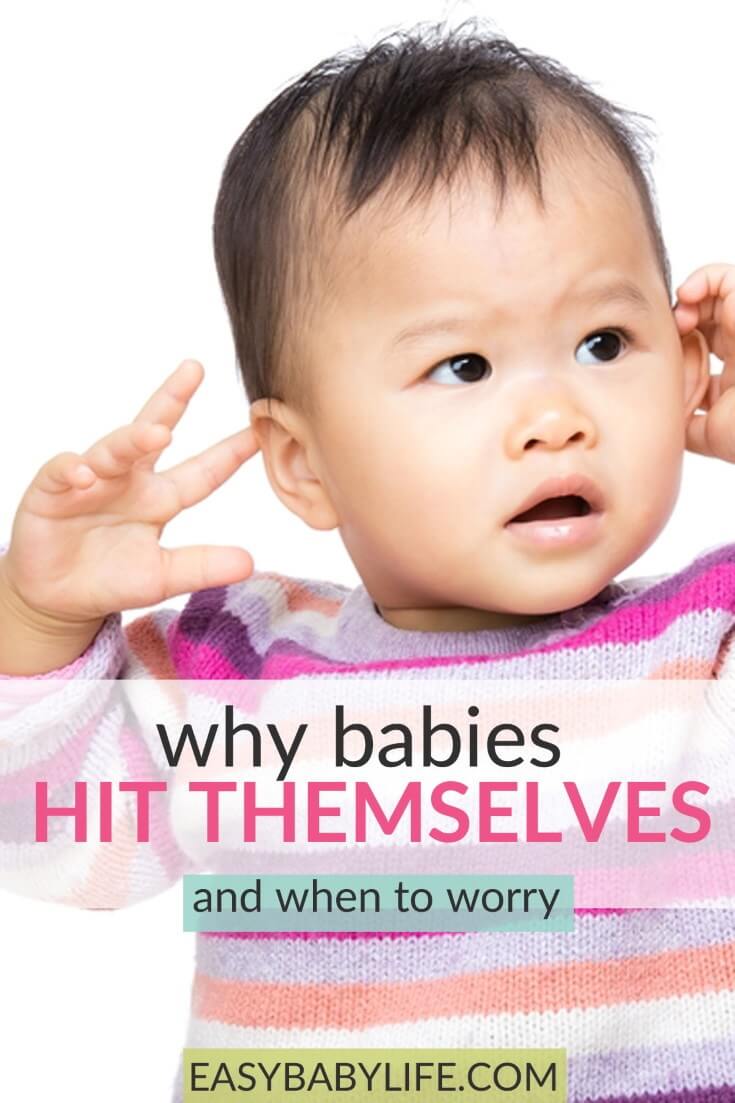
Research References
- Amy R.M. Gwyther, Arthur S. Walters, Catherine M. Hill, Rhythmic movement disorder in childhood: An integrative review, Sleep Medicine Reviews, Volume 35, 2017, Pages 62-75, ISSN 1087-0792, https://doi.org/10.1016/j.smrv.2016.08.003.
- Sallustro F, Atwell CW. Body rocking, head banging, and head rolling in normal children. J Pediatr. 1978 Oct;93(4):704-8. doi: 10.1016/s0022-3476(78)80922-6. PMID: 309000.
- Self-Injury in Autism Spectrum Disorder and Intellectual Disability
- Adam, H.M. (Ed) & Foy, J.M. (Ed) (2015). Signs & Symptoms in Pediatrics. American Academy of Pediatrics
- Voigt, R.G. et al (2011). Developmental and Behavioral Pediatrics. American Academy of Pediatrics.
Hand-picked related articles
The information in this article is provided by Medical Doctor Janina Kong. The purpose is to provide examples and knowledge to help parents dig deeper into their baby’s situation, not to offer a complete picture or a possible diagnosis.

Paula Dennholt founded Easy Baby Life in 2006 and has been a passionate parenting and pregnancy writer since then. Her parenting approach and writing are based on studies in cognitive-behavioral models and therapy for children and her experience as a mother and stepmother. Life as a parent has convinced her of how crucial it is to put relationships before rules. She strongly believes in positive parenting and a science-based approach.
Paula cooperates with a team of pediatricians who assist in reviewing and writing articles.

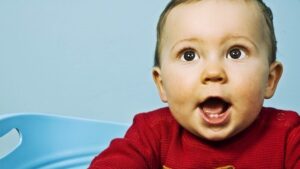
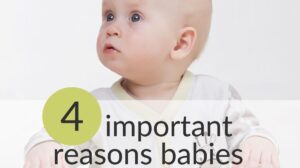
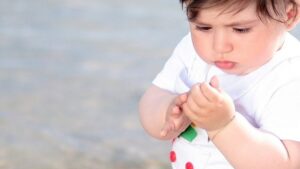
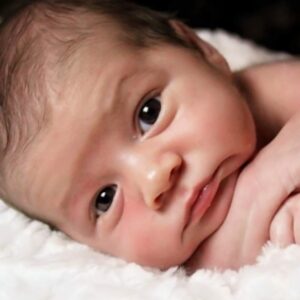
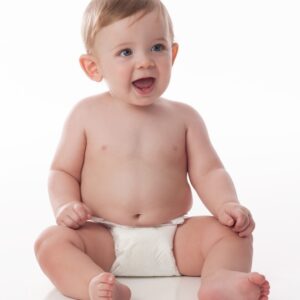

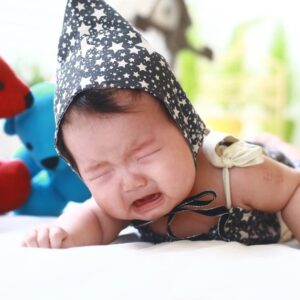
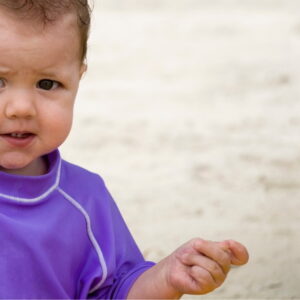
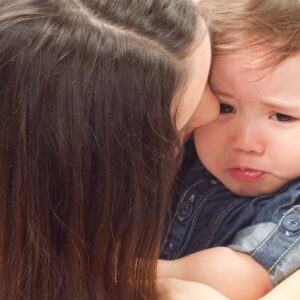
My baby is 3 months old n he constantly punches his chest with both hands repeatedly,im worried
My 12-month-old daughter will slap her head repetitively and when we try to stop her, she just continues to keep doing it. We try to tell her no and do nice and rub her face but it doesn’t stop her.
My husband and I are worried. Is this a phase she’s just going through or is it something more? She will also pull her hair too.
Please help us. Thank you!!
Being 12 months old, I would say yes, it is highly likely to be a phase she is going through! It is quite common for babies to do things like this at around their first birthday. They hit themselves, bite themselves, bang their little heads against the floor, or something similar when they are angry and frustrated. It looks really bad and I think you’re doing the right thing to continue to tell her and show her to not hurt herself. (Not that it will change her behavior…)
It will pass, probably within a few months or so. Just make sure she doesn’t hurt herself badly. And don’t be worried, it’s normal (but strange for us) and will pass!
Reasons to worry would be either if you think she might be hitting herself to mitigate pain, eg headache, her ears or teeth, OR if she really just hits herself repetitively for no apparent reason and also isn’t developing towards her milestones as you would expect. Both these possible situations would make a visit to the Dr appropriate.
My 18mth old niece has started throwing fits and fighting, kicking and screaming when it is time to change her diaper. Wet/poopy doesn’t matter. If you try to clean poop away/out of her vagina, she has even clamped her legs shut on me.
What do you think is the cause of this new behavior?
Hi,
So your niece has decided that she doesn’t like diaper change. Who can blame her :-)
Has she started expressing her will in other situations too – like wanting to feed herself, wanting to help to do “grown-up things” like getting dressed or deciding what to wear, helping with setting the table, or deciding when it is bedtime?
18 months is a mental development stage, going from baby to toddler and understanding a lot more about the world, including that many others around the house get to do things the toddler can’t. Frustrating for sure!
Many babies start refusing diapering at this age. My own youngest son simply took his diapers off everywhere. He hated them. And peed on the floor… I bought him a bright red potty at 18 months, and he loved trying it. He weaned himself off the diapers at 2.5 years old – just declared one Monday morning that he wanted only underwear because he had stopped using diapers. And he was right!
Here is a post I wrote about exactly the situation you are in, and how to deal with it.
One way to get around this problem is to let the baby stand up during the diapering. It can be a bit tricky to hold the baby and do the diapering at the same time, but you’ll get the hang of it. If they stand in front of a mirror, for example, it can be a great distraction.
Another possibility is a diaper toy – something she only gets to play with during the diapering.
Co-operating with an 18-months old takes creativity. They are determined, learn fast, and they are impossible to negotiate with or discipline, but wonderful in their urge to develop and be a “big girl or boy”.
Try focusing on having fun and avoid as many power struggles as possible. Of course, she needs to have her diaper changed, but maybe a little later, while standing up, playing with her toys, or whatever makes her co-operate. And why not give her a potty to try out when and if she wants?
And when you do change her diapers, make sure you don’t see anything that could be causing pain or discomfort, such as a bad diaper rash.
Hope this helps,
Paula
Folks,
First, if you are scared, you need to take your child to a Doctor and discuss it. Your doctor can assess whether this is just the normal odd behavior of a baby or something greater to be concerned over.
My one daughter was a headbanger, hitting her head against the floor or her crib until it made her cry sometimes. A visit to the doctor helped me understand that it is odd but normal. She grew to be a very happy and well-adjusted child and woman. So, please, discuss the concerns with your doctor and relax. Some of this is normal and part of them understanding their bodies and feelings, some may be indications of other issues. Only your doctor can really let you know.
I am going nuts over this issue. I have one daughter. She never did any of this hitting/banging head stuff. She is not/was not an ideal child but did not physically harm herself.
My grand-daughter seems to detest me. She smacks herself senseless and the simple fact that she is hurting herself for no reason really bothers me. I don’t get it. She is 15 months old. I watched her for her early days and into the first year. Now I am garbage.
My daughter is 20 months now, and she started a week ago hitting herself in the head when she’s upset or crying and she also covers her mouth when she cries.
I separated from her father, who is 25, about a month ago and we both now live with our parents. His household is a stressful environment to be in, lots of shouting, swearing, and temper tantrums from his younger brother. His whole family is very caring people who have big hearts and love to take care of each other, but with teenagers in the house, there is a lot of tension in the air.
Now, my house is very quiet, it is just me, my mommy, daughter, and our dogs. Even though I am still suffering from post-partum depression, it is still a much calmer environment to be in.
When my daughter returns from a day or night at her father’s house, she has panic attacks, hits herself in the head and covers her mouth when she cries. It upsets me very much to see my darling child hurt herself for no reason. My mother and I cannot figure out why she has started to do this. The only thing we can link it to would be how she feels when she is at her father’s house.
My mother thinks she is so wound up when she is there, that when she comes home she has to let it all out. When she is home she will not leave my arms, I still have to rock her to sleep in my arms and walk around her bedroom for about an hour, every single night. She still wakes up in the middle of the night crying and she has nightmares every second night.
I am so worried about my girl. I don’t know how to make her stop. When she starts hitting herself I just hold her hands away and say “it’s okay baby, it’s okay” in a very calming voice and press my face or my forehead against hers. She sometimes attempts to do it again, but I usually get her to stop.
The only option I see is taking her to the doctors to have it documented that she is stressed for future reference if a custody battle comes into play, and see what else our doctor recommends.
Can anyone explain what is happening to my little girl?
You and your daughter are in a new and stressful situation – no wonder your daughter is acting out. If she used to live with both you and her dad and now all of a sudden is always separated from one of you, it is a big change for her! Also living in new environments is a big change.
You say that her dad’s family is loving. That is great! If you can, ask him to protect her from the worst arguments over there. In the long run, she will learn that life is different with mom and dad and she will be cool about it.
The fact that she is acting out when she is with you (and not with her dad?) might be because she is more attached to you. Most babies are. So being away from you is tough and it has only been a month. But it doesn’t necessarily mean that dad’s house is bad for her.
Try to continue to do what you do – be with her, hold her, love her and also have FUN with her. Laughter is great for healing! You’ll get through and she will too.
Warm wishes,
My grandson started hitting himself when he was a baby. It always occurred when he became angry. Knowing his father has a violent temper has been what led us to believe that was the reason why.
It’s scary to watch and horrifying for your friends and family to watch. To top things off, he has always been a big, strong child and we always felt like he was hurting himself.
His father hasn’t been involved with Odin since he was about 5 months old. Although the parents still talk to each other, oddly enough, that relationship ended with the father being taken to the hospital because of hurting himself more than any of the things he was taking his anger out on at the time. Due to that, though, we’ve always been at a loss of how to get the baby to stop it.
My daughter started by holding him close during the episodes and continuing to explain after that we love him and he needs to love himself and not hurt the baby. It has gotten easier as he’s reached the age of wanting his caretaker to tell the floor or anything that hurts him not to anymore.
Odin is three now and still cannot explain what makes him attack himself sometimes but can at least scream through his tears “I’m mad!” when we ask why he’s hitting himself. Most of the time, he controls it. Now it’s easy enough to see it’s not all the time, just when he’s highly frustrated.
I know it sounds silly but you could get his hearing checked.
Our daughter used to have bad balance, not terrible, but more so than other toddlers. She also became self-abusive. She would hit her head and pull her hair. The clinic said to take her to the hospital; they thought she had a brain infection. Lucky us, she was only losing her hearing. It was a progressive loss due to a temperature that she got after one of her sets of infant shots.
She is now a completely deaf proud 13-year-old. It did make her upbringing a bit more challenging, but not nearly as complicated as a brain infection would have been.
It doesn’t hurt to rule it out. Good luck!
I was worried too so I had to look it up then came across this, it was very refreshing to know that it happens, but it is so scary.
My daughter has moved on to hitting her face then basically gouging her face with her nails. She is nearly two years old and I love her dearly, but I really don’t know what to say when she does it.
I thought I may as well drop my little something in to show I took an interest and Tina, it is nothing to worry about in the end.
My mother says ‘she will learn’ before or after scratching her face off mum. :-D